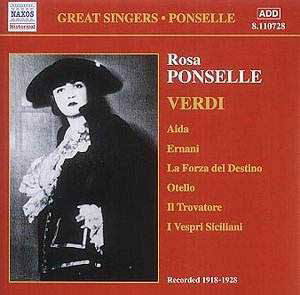The duplication continues. Pearl have given us the
Ponselle Columbias, Romophone the Victors. Ward Marston brought out
the 1930s radio broadcasts in two volumes on his own label. And we've
had the several volumes on (now defunct) Nimbus. Not to mention the
RCA Victor Vocal Series disc.
So what are the enticements here?
Well, there are several. The transfers are by Ward
Marston, a guarantee that they will be state of the art. There is almost
78 minutes of music on the disc (though Naxos modestly claim a mere
76:50 on the box). One example of every Verdi title Ponselle recorded
has been included and so the indolent, wishing to survey the style of
one of the great Verdians of the last century, need only push a button.
Then there is the singing. The voice itself, transcending
every limitation imposed by the old recording process that Marston's
wizardry cannot eliminate, seduces with its timbre, compels submission
with its sovereign technique (the even runs, the child's-play trills,
the silky-spun high notes, silvery and succulent at the same time, the
rich, firm mezzo-like low notes, the magisterial phrasing - compromised
occasionally by the speeds imposed by the "78" sides). And of course
the diva keeps the most excellent company: no more admired (and rightly)
Verdians than Martinelli, Pinza, and Stracciari.
Reservations? Some of the Columbias appear to have
been reproduced a shade flat - a conscious decision founded on assumptions
regarding the normative tuning in the Columbia studios of those days?
Mr Marston, in his short technical note, does not say. There have always
been disagreements about the proper speeds, especially for the Columbias.
Would Ponselle, an inveterate transposer, have sung all her arias in
the original key - even the Trovatore "D'Amor sull'ali rosee" in which
she touches the (optional) high D flat? To these ears the Vespri Bolero
sounds more natural a semitone below score pitch. About some of the
others (including that Trovatore item) I'm not so sure.
There is some minimal, momentary distortion from time
to time, the kind inherent in these old records and not the kind derived
from faulty reproduction or styli of inappropriate dimensions.
Veteran collectors will probably wonder if they need
to add yet another Ponselle disc to their well-stocked shelves. Younger
and first-time listeners have a treat of incomparable value in store
for a fiver.
Though multiple selections from a single opera are
grouped in the order they occur in the score, the listing on the box
and the insert will make you think that the first two Forza excerpts
are in incorrect order. In fact the notes are wrong; the CD follows
the score.
Calvin M. Goodwin


![]() See
what else is on offer
See
what else is on offer 